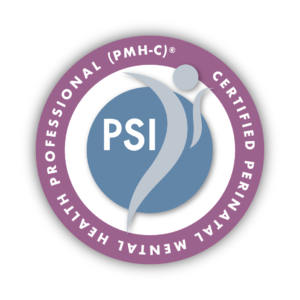
Brianne Billups Hughes, LMFT is a psychotherapist offering online therapy to California residents for individuals and couples with expertise in sexual and reproductive wellness. To schedule a therapy appointment with Brianne, contact her today.
Are you looking for a pregnancy therapist, postpartum therapist, or therapy for IVF or IUI, infertility, or therapy for new moms, dads, or parents? Having a perinatal therapist who understands the unique mental health challenges is important as you bring your baby into this world. You deserve specialized therapeutic support if you are trying to conceive, are pregnant, or recently had a baby.
What does “perinatal” mean?
The Merriam-Webster Dictionary defines perinatal as occurring in, concerned with, or being in the period around the time of birth. This word encompasses conception and pregnancy, as well as the postpartum period. Additionally, this word is inclusive of miscarriage and pregnancy loss.
Perinatal Mental Health
Postpartum Depression
Postpartum psychiatric disorders, particularly depression, have received increasing attention in the United States for several reasons. Postpartum depression is very common. According to Wisner and Chambers (2006) one in seven new mothers experience depressive episodes that impair maternal role function.
Another study showed the average prevalence rate of non-psychotic postpartum depression based on the results of a large number of studies to be 13% of the population. The strongest predictors of postpartum depression were psychological disturbance during pregnancy, poor marital relationships, low social support, and stressful life events (O’hara & Swain, 1996). Learn more about postpartum couples therapy here.
Postpartum Anxiety
Additionally, anxiety is the most predominant mental health disorder affecting at least a quarter of the global population. Generalized anxiety disorder (GAD) afflicts 6.8 million adults or over 3% of the United States population. Less than half of those individuals are undergoing treatment. Women are twice as likely to be affected than men. Women in the perinatal and postpartum period appear particularly vulnerable to anxiety disorders, affecting between 11% and 21% of women in the US (Zappas et. al., 2020).
Postpartum anxiety is even more prevalent than postpartum depression but is often underdiagnosed by clinicians and patients because it is challenging to differentiate between normal pregnancy and postpartum symptoms and those that cause significant impairment. One study found the incidence of postnatal anxiety was 17.1%, and therefore surpassing the incidence of postpartum depression. Symptoms of tension, fatigue, irritability, changes in concentration, and insomnia are all hallmarks of General Anxiety Disorder. The Diagnostic and Statistical Manual of Mental Disorders, Fifth Edition (DSM-5) does not specifically address Generalized Anxiety Disorder during the postpartum period, and as a result, the disease is often underdiagnosed or treated. (Zappas et. al., 2020).
Other Perinatal Mental Health Concerns
Other mental health issues that are often misdiagnosed or misunderstood are postpartum obsessive-compulsive disorder (OCD), post-traumatic stress disorder from trauma related to conception, pregnancy, miscarriage, birth, or postpartum, or postpartum psychosis.
Certification in Perinatal Mental Health
Postpartum Support International
Postpartum Support International (PSI) was founded in 1987 by Jane Honikman in Santa Barbara, California. The purpose of the organization is to increase awareness among public and professional communities about the emotional changes that women experience during pregnancy and postpartum. Their goal is to provide current information, resources, and education, and to advocate for further research and legislation to support perinatal mental health.
According to Postpartum Support International’s website, the Perinatal Mental Health Certification Program creates a structure for professional education and evaluation, and standardization of training and experience to inform families and payers of perinatal mental health specialists. The certification curriculum requirements build on existing evidence-based perinatal mental health certificate trainings, adding an advanced training component.
Requirements to become Certified in Perinatal Mental Health (PMH-C):
- Two Years of Work Experience in the Profession with the Perinatal Population
- 14 Hours of Perinatal Mood and Anxiety Certificate Course
- 6 Hours of Advanced Specialty Training in Perinatal Mental Health
- Pass Competency Exam
- Complete 6 Hours of Continuing Education in Support of Perinatal Mental Health Annually After Certification
Therefore, Perinatal Mental Health Certified therapists have taken advanced training in understanding mental health issues specific to pregnancy, postpartum, as well as infertility and pregnancy loss in addition to their training as their licensing requirements to become a licensed mental health professional. Looking for therapy for new moms and therapy for new dads is a big step toward caring for your own postpartum depression or postpartum anxiety, or other perinatal mental health concerns. Finding a PMH-C therapist in Santa Barbara, Ventura, Westlake Village, or Malibu who understands and specializes in treating perinatal mental health is an important way to improve your wellbeing. Please send me an email if you have further questions about my qualifications or you would like me to be your therapist!
References:
O’hara & Swain (1996). Rates and risk of postpartum depression—a meta-analysis. International Review of Psychiatry, 8(1), 37–54. https://doi.org/10.3109/09540269609037816
Wisner et. al. (2006). Postpartum Depression: A Major Public Health Problem. JAMA. 2006; 296(21):2616–2618. doi:10.1001/jama.296.21.2616
Zappas, et. al. (2020). Postpartum Anxiety. The Journal for Nurse Practitioners. 17. 10.1016/j.nurpra.2020.08.017.
Merriam-Webster. (2024). Perinatal definition & meaning. Merriam-Webster. Retrieved April 4, 2024 from https://www.merriam-webster.com/dictionary/perinatal

